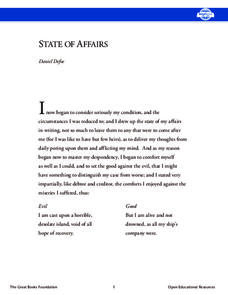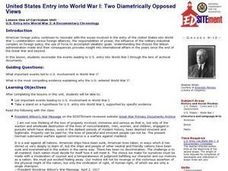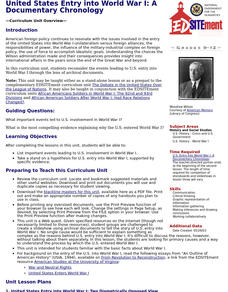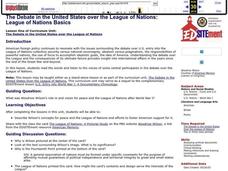Great Books Foundation
State of Affairs
Good verses evil. Scholars make inferences after taking a close look at the short story, State of Affairs, in which Daniel Defoe goes back and forth comparing good and evil thoughts through his writing. After reading the text, there are...
Curated OER
State of Affairs
Students examine the various roles and duties of state government officials and offices to create an Informative Guide to Our State's Government. They explore the changing relationship between governor and lieutenant governor in New York.
National Endowment for the Humanities
Lesson 2: The United States, France, and the Problem of Neutrality, 1796–1801
While the French Revolution could be considered inspired by the American Revolution, it created thorny problems for the new United States. Should the United States get involved and be drawn into a European drama? Was the US strong...
National Endowment for the Humanities
Lesson 1: The United States Confronts Great Britain, 1793–1796
After the Revolutionary War, the success of the United States was far from guaranteed. Foreign powers coveted the new land, and Great Britain challenged American sovereignty. Learners consider the challenges facing the new nation using...
Curated OER
Decoding US Foreign Policy: The Iran-Contra Affair
This is a really good lesson. Learners explore US Foreign Policy, the Reagan Administration, and the Iran-Contra Affair through various documents and readers theater. Worksheets, script, and web links are all included. Teaching can't get...
Center for History Education
U.S. Foreign Policy and the Iran-Contra Affair: Was Oliver North a Patriot, a Pawn, or an Outlaw?
If you had to write a song about Oliver North, would it be a ballad or a dirge? If you had to put him on a trading card, would he be a hero or the bad guy? Young historians decide for themselves after examining documents from the...
Curated OER
Central American Immigrants to the United States: Refugees from Unrest
Students identify the major aspects of Olmec and Mayan civilzations, including economic, political, and religious. They list contributions of these civilizations. Students identify the Central American countries where the United States...
Curated OER
State of Affairs Between the Native Americans and the European Settlers
Eleventh graders analyze multiple resources to explain the contacts between the American Indians and the European settlers during the Age of Discovery. In this American history instructional activity, 11th graders analyze a historical...
Curated OER
The Happy Progress of Our Affairs: George Washington and the U.S. Constitution
Students engage in a lesson which uses Washington's own words to illustrate the events leading to the establishment of our national government, and the crucial roles he played throughout that process.
Curated OER
United States Entry into World War I: Two Diametrically Opposed Views
Young scholars analyze the events leading to U.S. entry into World War I. They read a speech by President Wilson and an opposition speech, list the reasons each gives for American entry into the war, and complete a Venn diagram.
Curated OER
United States Entry into World War I: A Documentary Chronology
Students complete a unit of lessons on the events that led to U.S. involvement in WWI. They complete a Webquest, conduct research, complete a Venn diagram, read and discuss the reasons for entering the war, and create a slideshow.
Curated OER
The Debate in the United States over the League of Nations
Students investigate Woodrow Wilson's ideas for peace through the League of Nations. They examine how he attempted to encourage American support for the League and the opposition to it that was found in the Senate.
Curated OER
The Debate in the United States over the League of Nations: League of Nations Basics
Learners examine Woodrow Wilson's ideas for peace and the League of Nations. They examine how he garnered supported of it by looking at images and discussing their context.
Curated OER
The Debate in the United States over the League of Nations: League of Nations Basics
Students describe Woodrow Wilson's concepts for peace and the League of Nations and efforts to foster American support for it.
National Endowment for the Humanities
The Debate in the United States over the League of Nations: Five Camps: From Voices of Consent to Voices of Dissent
Students explore and discuss Woodrow Wilson's concepts for peace and the League of Nations. They understand efforts made to foster American support for the League and discuss the opposition shown in the Senate.
Curated OER
American Studies
Entitled American Studies, this small unit covers various topics related to the study of the United States. Learners warm up by creating a dictionary of democracy, then dive into three different lessons focused on government, famous...
Heritage Foundation
The Office of the Executive
An executive is not just a leader of a company; you can also use the term to describe the president of the United States. The ninth part of a 20-part unit teaches high schoolers about the importance of the executive branch and the...
Curated OER
America's Wars, 1898-1945
Students examine the wars the United States was involved in between 1898 and 1945. In groups, they determine the causes and effects of each war and how each war changed the way the United States handled their foreign affairs. As a class,...
Student Handouts
Foreign Affairs
Inform your class about foreign policy during the Reagan administration. The resource includes a reading passage that gives an overview of foreign policy decisions made during the Reagan administration and nine questions for pupils to...
National Endowment for the Humanities
Lost Hero: Was John Hanson Actually the First President?
The first president of the United States was ... John Hanson? Scholars investigate the notion that the initial leader of the nation was not George Washington. Using research, articles, and open discussion, individuals create a quest for...
PBS
Evolution of the Presidency: Theodore Roosevelt to Franklin D. Roosevelt
How much power should a president be allowed to exert? Theodore Roosevelt and Franklin D. Roosevelt exercised their power according to their interpretations of the United States Constitution, and these interpretations affected the...
Curated OER
Book: Crossing the Seas
As learners read each chapter of Eric Schwartz's Crossing the Seas, they analyze the actions of United States in Venezuela, Hawaii, Cuba, the Philippines, Puerto Rico, and the intent of the Monroe Doctrine. They then compare American...
ProCon
President Bill Clinton
Was Bill Clinton a good president? Scholars set out to answer the question as they prepare for a class debate on the topic. They watch videos, review pros and cons, and read facts about the process of becoming a United States president....
Curated OER
Church and State Separation: The Challenge and the Debate
Students describe the basic elements of the U.S. Constitution's First Amendment as it relates to the separation of church and state and freedom of religion.

























